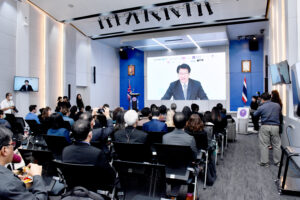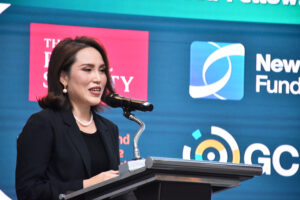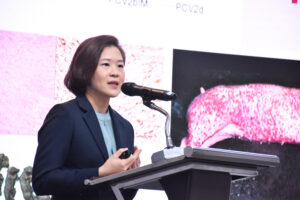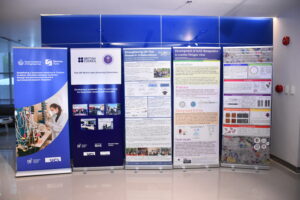
7/07/2023–In a joint press conference, Thailand’s National Center for Genetic Engineering and Biotechnology (BIOTEC), King Mongkut’s University of Technology Thonburi (KMUTT), and the UK’s University of Kent and University College London (UCL) unveiled the remarkable achievements of three collaborative projects. These initiatives, backed by funding exceeding 170 million baht, were announced to the public, highlighting the fruitful partnership between the institutions.




ASEAN countries, including Thailand, play a significant role in global food production, specifically in aquaculture and livestock. As the demand for food from these industries rises, there is a need for efficient veterinary health management technology to prevent and manage emerging and re-emerging diseases, while maintaining the wellbeing of the animals.
Acknowledging the criticality of collaboration and technology transfer from advanced countries like the United Kingdom to Thailand, Professor Colin Robinson of University of Kent and his team has embarked on a transformative mission. Their efforts aim to enhance the country’s capabilities in animal health, particularly in the crucial domains of veterinary vaccine production and therapeutic development.
BIOTEC, KMUTT, University of Kent and UCL have embarked on long-term research collaboration to enhance scientific advancement and to help increase the availability and affordability of veterinary vaccines in Thailand. Funded by the governments of UK and Thailand, several collaborative activities have successfully contributed to the overall improvement of animal health and welfare, food security, public health and human resource development.




Algal biotechnology in shrimp aquaculture
Shrimp aquaculture has been threatened by significant losses due to viral pathogens such as white spot syndrome virus (WSSV).
Since 2018, University of Kent and BIOTEC have been actively engaged in the use of antiviral microalgae in aquafeed for disease control through collaborative projects on ‘Establishment of RNAi-based algal technology for sustainable disease control in shrimp cultivation (funded by Thailand Research Fund and UK’s Royal Society)’ and ‘Development of novel microalgal-based systems for shrimp disease control in South East Asia (funded by UK’s Royal Society)’.


Dr. Vanvimon Saksmerprome, a principal researcher of BIOTEC, revealed that the team has made significant progress in the development of novel dsRNA production platforms in microalgae. The technology has been successfully implemented in shrimp farms, where it has proven highly effective in combatting viruses by knocking down viral genes. This breakthrough represents a significant step forward in sustainable practices to combat viral infections in the aquaculture industry.
Additionally, Professor Robinson of the University of Kent explained that their team has created a simple and affordable technology for precise engineering of the chloroplast of microalgae, allowing for the production of biomolecules.


Prof. Saul Purton of UCL and Director of Algae-UK, working together with Professor Robinson, has created a simple and affordable technology for precise engineering of the chloroplast of microalgae, allowing the production of biomolecules such as dsRNA and protein vaccines. Both groups are building on their collaborative successes with Thai researchers in development of low-cost animal vaccines using algal platforms and to move these technologies towards commercialization.
With combined expertise, the use of antiviral microalgae in aquafeed for disease control has established a new paradigm for shrimp cultivation for future sustainable food production.
Animal Vaccine and Biotherapeutics
Swine industry is massive in Thailand, with close to 150,000 households maintaining pigs. However, the industry continues to be plagued by viral epidemics. Thailand relies on imported vaccines but they are often expensive and less effective as local viral strains are different.
Leading institutes in the UK (Kent, UCL, Imperial College, London School of Hygiene & Tropical Medicine) and Thailand (BIOTEC and KMUTT) have been working to develop the country’s own veterinary vaccine platforms in Thailand as part of a GBP 3.93 million (THB 160,000,000 million) joint project titled “Establishment of Biopharmaceutical and Animal Vaccine Production Capacity in Thailand and Neighbouring South East Asian Countries”. The project was funded by UK Research and Innovation’s Global Challenges Research Fund (GCRF) for the period of 2018-2022.


Prof. Robinson revealed that the project proposed two bold objectives based on the recombinant protein production platforms: affordable human biosimilars and tailor-made swine vaccines and biotherapeutics. For the veterinary side, Dr. Peera Jaru-Ampornpan of BIOTEC, explained that the team has successfully developed a potential subunit vaccine prototype against PCV2d, a major subtype of a swine pathogen associated with postweaning multisystemic wasting syndrome. The team also developed a production platform for recombinant interferon to be used as future broad-spectrum veterinary therapeutics


Additionally, Dr. Lalintip Hocharoen of KMUTT explained that the project also includes building technical capacity in Thailand to produce recombinant proteins at large scale at the National Biopharmaceutical Facility (NBF), a state-of-the-art facility established by BIOTEC and KMUTT for large-scale production of biopharmaceuticals and animal vaccines. The team has successfully developed the PCV2d vaccine candidate at 30-L scale and the platform has shown reproducibility by technology transfer to another production site at UCL. Nonetheless, bioprocess workforce development has also been carried out via industrial-oriented research and co-design training platforms with the UK teams. Prof. Robinson added that the UK teams have provided support in protein production, purification, analytics, and technical training to ensure compliance with regulations.
Through the collaboration and expertise of both teams, improvements have been made at every stage of the animal vaccine production value chain.






